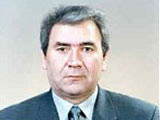|
|
TODAY.AZ / Politics
Jamil Hasanly: "Day of Baku's Liberation is an important day in the history of the people and it should be marked on the state level"
15 September 2008 [14:34] - TODAY.AZ
September 15, day of Baku's liberation, is an important day in the history of the Azerbaijani people, said historian Jamil Hasanly.
 He noted that after May 28, day of independence of the Azerbaijan People's Republic, this is the second important day and it should be marked on the state level.
He noted that after May 28, day of independence of the Azerbaijan People's Republic, this is the second important day and it should be marked on the state level."The fight for Baku was fierce at that time. The first world war raised the oil demand of the countries. The British noted that despite the advantage in war, the situation may reverse depending on who will hold the Baku oil. One of the members of the Azerbaijani delegation mentioned an important detail at the Prague peaceful conference, later followed by immigrant Miryaqub Mirmehtiyev in his book "The Caucasus problem". He wrote that in 1918 the British lion rushed to Baku in order not to allow to the German eagle to land on the oil derricks", said the historian.
At the same time, Hasanly noted that by that time Armenians dominated within different governments in Baku, including the Baku council, Central Caspian dictatorship and the genocide of the Azerbaijani people was committed in March. He reminded that in his letters to Lenin, Shaomyan admitted the events and noted that if they did not do so, Baku would have turned into the capital of the Azerbaijani khanate.
"In these conditions liberation of Baku was a primary task, facing the government, and the plan of operation was prepared immediately after moving to Ganja. The Caucasus Islam Army was created with the military units, arriving from Turkey, and the army started its glorious march to Baku on June 23", said he.
The historian noted that Kurdemir and Goychay were liberated in June. According to him, Mamed Emin Rasulzade, visiting Turkey at that time, wrote to Prime Minister Khoyski and Foreign Minister Mamedhasan Hajinski that Baku should be liberated, otherwise, wave farewell to the country.
The deputy announced that those who criticize the founders of the Azerbaijan People's Republic should know that during the start of military actions for liberation of Baku the government worked in a carriage office and moved to the capital with the troops.
The historian noted that in 1918 the Gurban holiday fell on September 15, therefore, the strategic plan envisioned celebration of this Holy day by the Muslims in their native city.
"I have spoken in details about it as the young generation should know their history. Most have no idea about it, as we do not speak much about it. The declaration of this day as a state holiday would draw attention to this remarkable day and the young generation would have something to learn and to take a pride in", said Hasanly.
/Day.Az/
URL: http://www.today.az/news/politics/47561.html
 Print version
Print version
Views: 1920
Connect with us. Get latest news and updates.
See Also
- 05 June 2025 [18:19]
ADA-Luiss Forum held in Rome to strengthen Azerbaijan-Italy ties - 05 June 2025 [15:51]
"Are you a kid or not a kid?" Pashinyan takes Garegin on weak - 05 June 2025 [15:38]
Baku Military Court examines environmental and economic damages caused by Armenia’s aggression - 05 June 2025 [12:46]
President Ilham Aliyev congratulates people of Azerbaijan on occasion of Eid al-Adha - 05 June 2025 [11:38]
Azerbaijani Prime Minister Ali Asadov attends CIS Heads of Government Meeting in Dushanbe - 05 June 2025 [10:41]
Azerbaijani diaspora leaders in Belgium meet to boost unity and outreach - 05 June 2025 [10:10]
The Armenians are being led by the nose by the World Council of Churches - 05 June 2025 [10:00]
World Environment Day celebrated in South Korea, Azerbaijan named host for 2026 - 04 June 2025 [23:11]
Iran's President Masoud Pezeshkian makes phone call to President Ilham Aliyev - 04 June 2025 [18:43]
Ombudsman highlights human rights values at “Silenced Voices” event in honor of Huseyn Javid
Most Popular
 Baku strengthens its role in shaping Europe's energy architecture
Baku strengthens its role in shaping Europe's energy architecture
 Iran appoints new ambassador to Azerbaijan
Iran appoints new ambassador to Azerbaijan
 Pashinyan continues to spin scandal around Garegin II
Pashinyan continues to spin scandal around Garegin II
 About 20 thousand employees of the Volkswagen carmaker agree to be fired
About 20 thousand employees of the Volkswagen carmaker agree to be fired
 The Armenians are being led by the nose by the World Council of Churches
The Armenians are being led by the nose by the World Council of Churches
 Israeli Prime Minister Benjamin Netanyahu congratulates Azerbaijani President
Israeli Prime Minister Benjamin Netanyahu congratulates Azerbaijani President
 Lachin emerges as gateway of peace and partnership
Lachin emerges as gateway of peace and partnership
